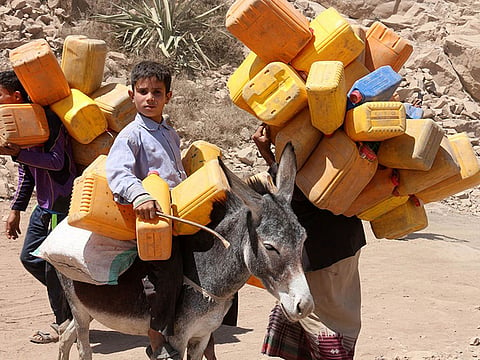Yemen water shortage ‘may become bigger problem than war’
Yemenis pay more than 30% of their income for water, the highest rate in the world

London: The price of water is rising steeply in Yemen, which may run out of water for its 25 million people, experts say, adding to the misery caused by Arab air strikes and the civil war ravaging one of the world’s poorest and driest countries.
An Arab military coalition has since late March been bombing the Iran-backed Al Houthi militia that has taken over much of the country.
The bombing is aimed at restoring Yemen’s exiled president to power, and the alliance’s virtual blockade of Yemen’s airspace and ports has cut off supplies of food and fuel to the impoverished country.
Most of the gas-powered pumps providing water are now inoperable, and water from those that still work doesn’t come cheap.
“Ordinary Yemenis now pay more than 30 per cent of their income just to get water in their houses, the highest rate in the world,” said Abdul Khaleq Alwan, a senior expert at Yemen’s water and environment ministry.
Prices have more than tripled since March, reaching 10,000 Yemen rials (Dh170) for a four cubic metre tank of water, Alwan said from Sana’a.
The price of water has risen so steeply because the price of diesel used to pump water from the wells, and that of petrol to run the trucks, has gone through the roof, Alwan said.
“The well owners can barely afford to buy diesel on the black market because of the crazy prices, sometimes around $100 [Dh367] for 20 litres of diesel,” while petrol costs around $40 for 20 litres on the black market, he said.
The only alternative for water truck owners is to queue for three to four days to buy fuel more cheaply from petrol stations, he said.
In a country where more than half the population lives on less than $2 a day, some simply can’t afford to buy water at all.
“Poor families in both urban and rural areas are absolutely unable to purchase clean and safe water at such prices and therefore started to fetch water in cans on their heads,” Alwan said.
In some cities and suburban areas, including the capital Sana’a with its two million people, wealthy residents pay water well owners and drivers to deliver water for free to poor areas, where women and children, who are usually responsible for fetching water, can fill their containers.
But as prices keep rising, Yemenis may before long have to accept that their water supply is running out — though no one knows exactly when the wells will dry up.
According to a report by the UN Development Programme (UNDP), Yemen is withdrawing almost 169 per cent of its renewable water resources, meaning that it is using water far faster than it can replenish its supplies.
The gap between the country’s demand for and supply of water has widened to 1.4 billion cubic metres per year as a result of one of the highest population growth rates in the world and people’s extensive use of water, Alwan said.
“Estimates for the water storage in the Sana’a basin are unreliable,” he said.
“Although it is difficult and unpractical to tell people when the basin water is going to vanish, it seems that the deadline will not be that far away if the ongoing high depletion rates continue.”
William Cosgrove, a water expert and former World Bank water resources specialist for the Middle East, says much of the problem in Yemen is caused by the illegal drilling of wells.
“The issue in Yemen is the same as the one that’s creating problems in restoring peace there now: it’s a tribal country, so depending on who’s the leader of the tribe and whether they’re allied with the government or not, the law gets respected or it doesn’t get respected,” he said.
In the case of Sana’a, the problem is not only that the city’s aquifer could run dry at any time, but also that the city is hundreds of kilometres from the sea and has no alternative water supply, Cosgrove said.
‘Ghost city’
“Eventually they will end up with a ghost city because a city with no source of drinking water, located far from any place where there is water — it would be a major catastrophe,” he said.
“While the war is going on, the water level in the aquifer is going down, so the [water] problem may end up being bigger than the war.” Alwan said the war had halted government efforts to draw up a long-term plan to deal with Yemen’s water problems, and there was currently no emergency plan in place.
One solution would be to boost development in coastal areas where water can be desalinated, he said, and to transform the rural economy by persuading farmers to stop growing khat, the profitable but extremely thirsty plant Yemenis chew as a stimulant — if they could find higher-value alternative crops.



